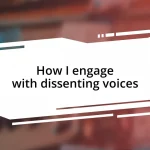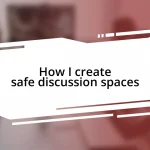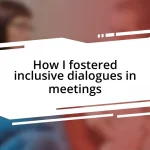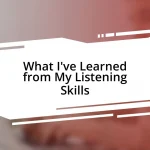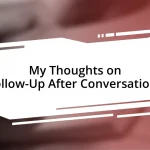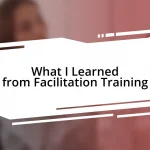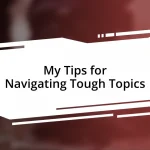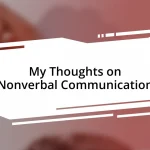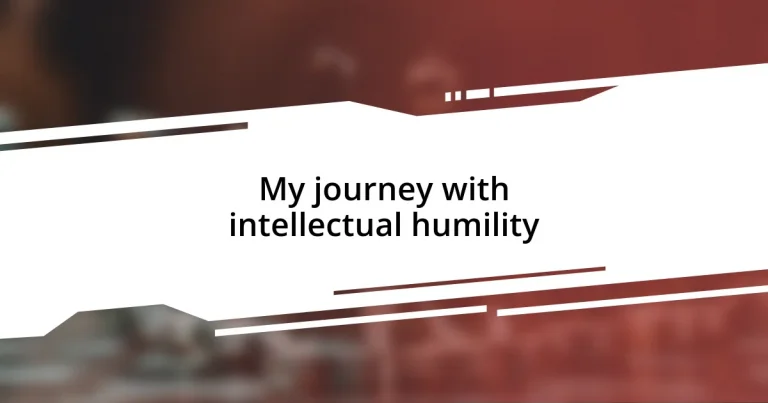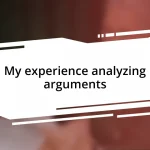Key takeaways:
- Intellectual humility involves recognizing the limits of our knowledge and being open to learning from others, fostering richer discussions and professional relationships.
- Self-awareness is essential for intellectual humility, as it helps us acknowledge our biases and limitations, encouraging a collaborative approach to learning.
- Engaging with diverse perspectives and seeking feedback can transform our understanding and promote a growth mindset, essential for continuous learning and connection with others.
- Reflecting on personal experiences and embracing feedback as opportunities for growth leads to deeper connections and insights into our own assumptions and beliefs.
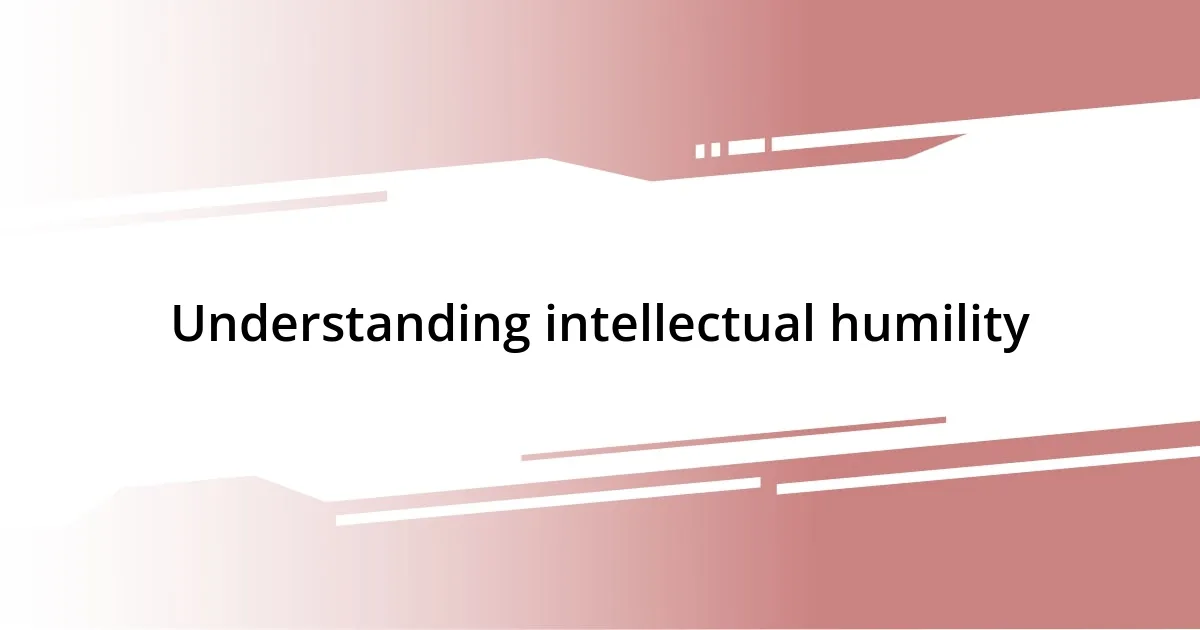
Understanding intellectual humility
Intellectual humility is the recognition that our knowledge is limited and that there’s always more to learn. I remember a time when I was adamant about a point during a group discussion, only to discover later that my source was outdated. It was a humbling moment that made me question: how often do we cling to our beliefs without considering alternative perspectives?
Embracing intellectual humility allows us to engage with others in a more sincere way. I once listened to a colleague who held an opposing view, and instead of immediately countering their arguments, I asked questions to understand their reasoning. This shift not only enriched my perspective but also deepened our professional relationship, highlighting how openness can transform discussions.
Recognizing my own fallibility feels liberating—it encourages growth rather than stagnation. Have you ever expressed certainty only to feel discomfort when challenged? Embracing that discomfort can lead to profound insights, reminding us that it’s okay to be wrong and that learning is a continuous journey.
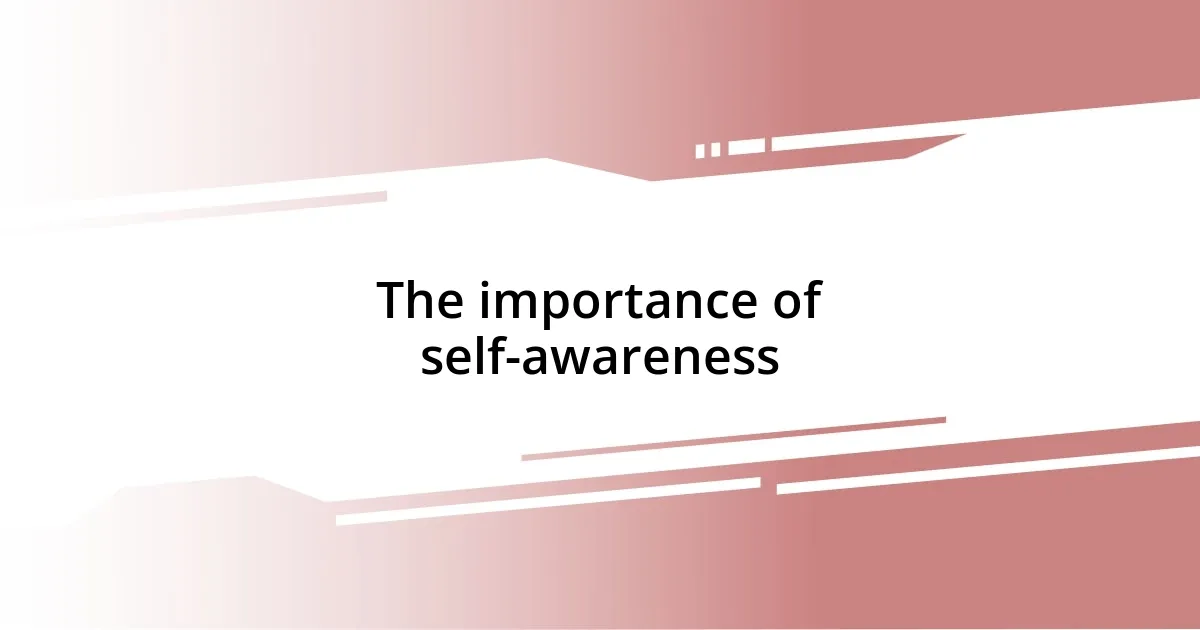
The importance of self-awareness
Self-awareness is essential in fostering intellectual humility. I remember a time when I prided myself on my analytical skills. However, during a feedback session, a mentor pointed out that I often overlooked emotions in complex discussions. This realization was eye-opening; understanding my own blind spots has since improved my decision-making and relationships.
Being self-aware allows us to understand not just our skills but also our limitations. There was a moment when I realized that my need to be right often overshadowed the chance to learn from others. This reflection helped me embrace a more collaborative approach, where I actively seek feedback rather than fearing it. How many opportunities do we miss because we are too focused on defending our own beliefs?
The journey toward self-awareness is ongoing and often filled with uncomfortable truths. I recall feeling a wave of anxiety when I recognized that my assumptions were mostly shaped by biases. Acknowledging this stirred feelings of vulnerability, but it also empowered me to push boundaries and engage with diverse perspectives. Embracing these challenging emotions has been crucial in developing my intellectual humility.
| Self-Awareness | Intellectual Humility |
|---|---|
| Recognizes personal limits | Values others’ perspectives |
| Fosters growth mindset | Encourages open-mindedness |
| Promotes honesty with self | Facilitates learning from mistakes |
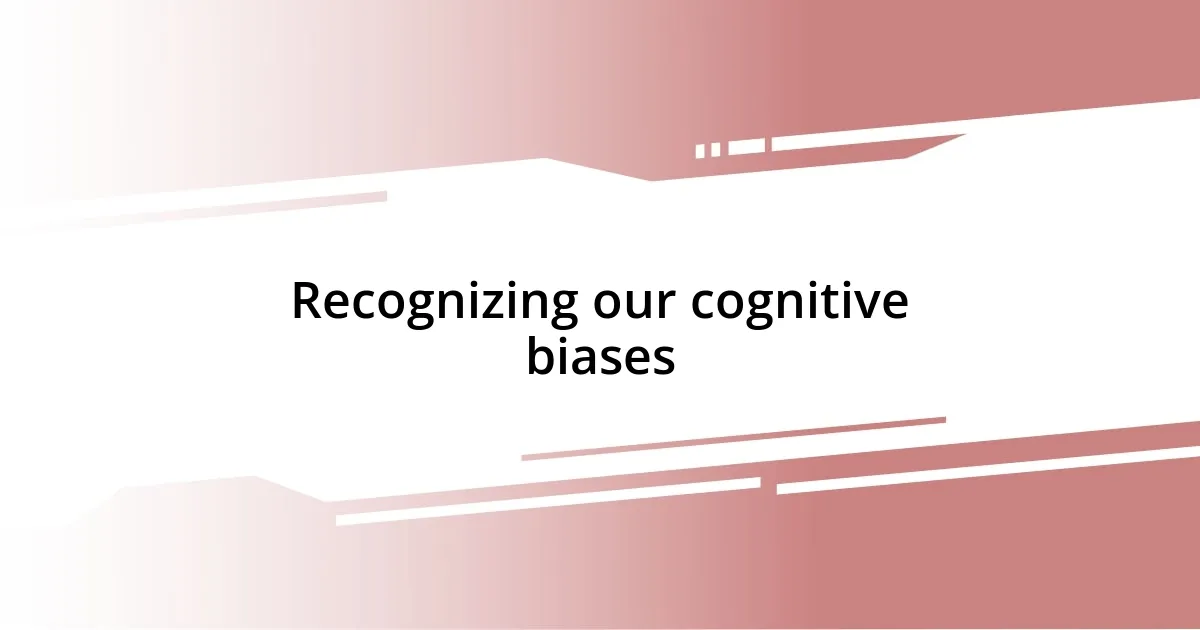
Recognizing our cognitive biases
Recognizing our cognitive biases is a crucial step towards intellectual humility. I had an experience during a heated debate when I caught myself favoring information that confirmed my pre-existing beliefs. It was a startling realization that made me consider how often I unconsciously filter out contradicting evidence. This awareness highlighted the importance of actively seeking diverse perspectives instead of reinforcing my own view.
- Confirmation bias: The tendency to favor information that supports our beliefs.
- Anchoring bias: Relying too heavily on the first piece of information we encounter.
- Dunning-Kruger effect: Overestimating our competence in areas where we might actually have limited knowledge.
- Hindsight bias: Believing we could have predicted an event’s outcome after it has happened.
- Availability heuristic: Relying on immediate examples that come to mind, which can skew our judgment.
Being mindful of these biases can transform how we engage with others. Each time I remind myself to question my assumptions, I find it much easier to listen and learn. Acknowledging that my perceptions are often filtered through a biased lens enriches my understanding and fosters healthier interactions.
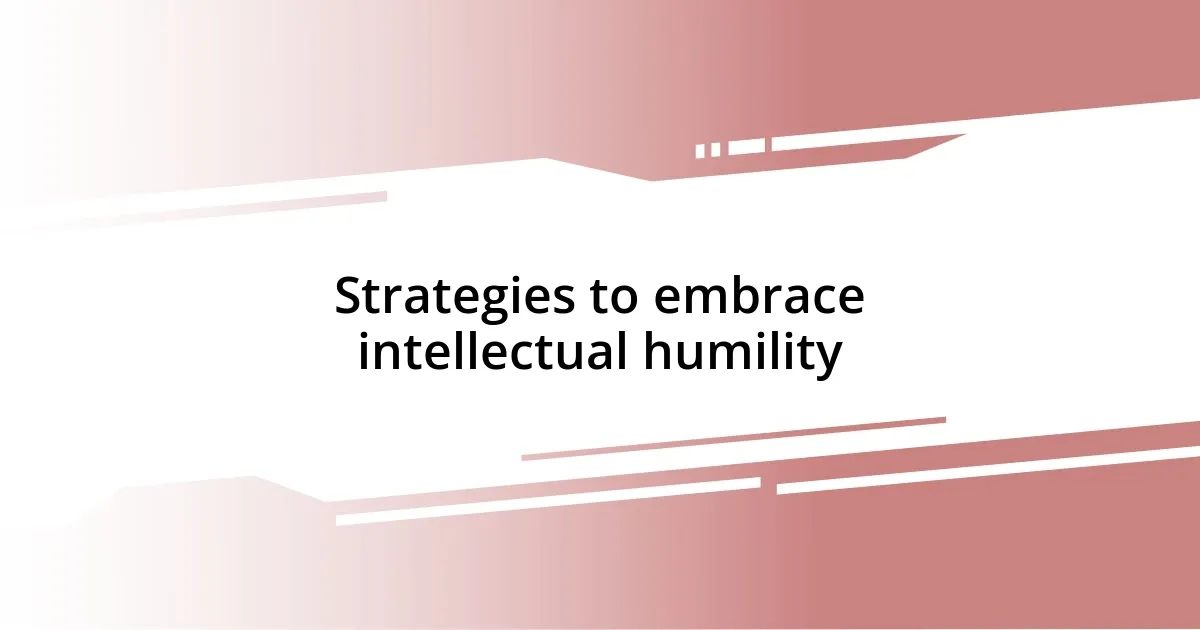
Strategies to embrace intellectual humility
To truly embrace intellectual humility, one powerful strategy is to actively seek out and engage with perspectives that challenge our own. I remember attending a workshop where participants were intentionally paired with those who held opposing views. At first, it felt uncomfortable to listen to arguments that I strongly disagreed with. However, by the end of the session, I found myself reflecting on nuances I hadn’t considered before. It made me wonder—how often do we shield ourselves from differing opinions simply because they stir up discomfort?
Another effective approach I’ve found is to cultivate curiosity about others’ experiences. I had a conversation with a colleague who had faced profound struggles in their career. As I listened to their story, I could see clear parallels to my own challenges, but from a totally different angle. This made me realize how much I could learn from their journey. The more I practice this curiosity, the more I crave those conversations that push my thinking beyond my comfort zone. Isn’t it fascinating how our stories shape our views?
Lastly, I encourage making humility a part of your daily practice. I started keeping a journal where I reflect on instances where I might have been too quick to judge or dismiss an idea. One entry that stuck with me involved a project where I mistakenly thought I had all the answers and later realized my approach was flawed. Learning to document my missteps not only highlights my growth but also prompts me to acknowledge the value of others’ contributions. Have you ever taken a moment to reflect on your own growth? This practice can be a meaningful journey toward embracing intellectual humility.
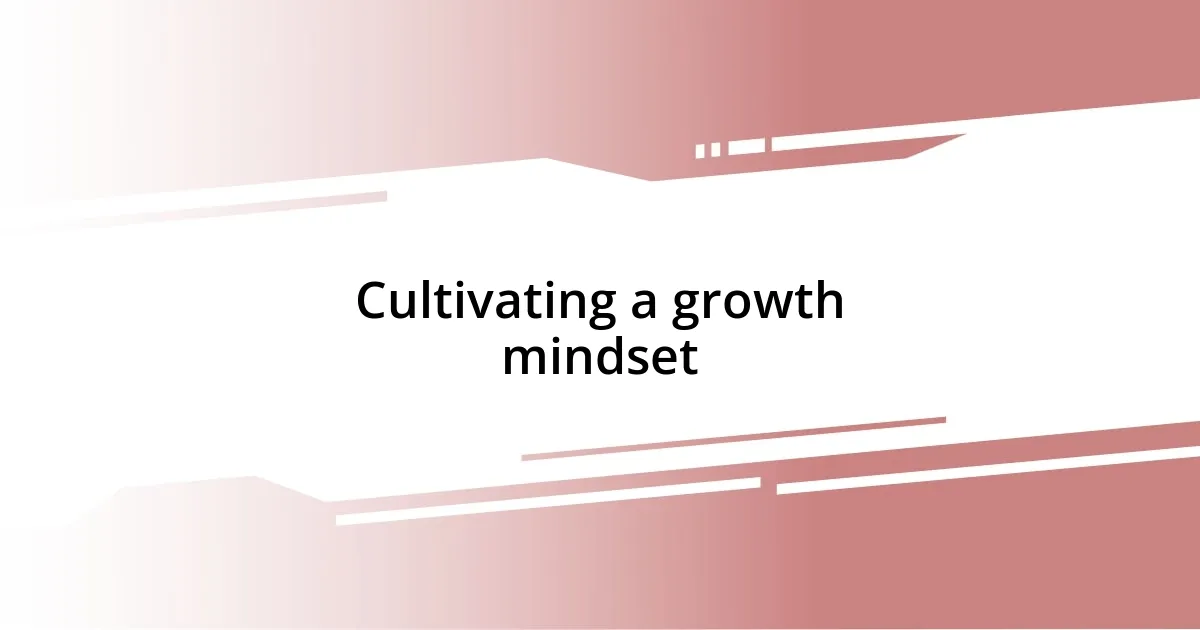
Cultivating a growth mindset
Cultivating a growth mindset is essential for embracing intellectual humility. I recall a time during my studies when I faced a challenging subject that left me feeling utterly defeated. After initially wanting to give up, I shifted my approach and sought feedback from peers and professors. This transformation taught me that every setback is really an opportunity for growth, and it’s an insight I carry into every learning experience now.
When I think back to my early career days, I can still feel the mixture of excitement and anxiety that came with new challenges. I vividly remember working on a project that required skills I believed were beyond me. Instead of shying away from these tasks, I chose to view them as a chance to expand my abilities. Among the many lessons I learned, one stood out: asking for help and embracing the discomfort of being a novice is vital for growth. Have you experienced that moment where embracing a challenge led you to unexpected places?
Maintaining a growth mindset isn’t just about personal achievement; it also shapes how we engage with others. I’ve noticed that when I approach conversations with the intent to learn rather than to win, it deepens my connections. My favorite moments come when I hear diverse perspectives that push my thinking further, leaving me more enriched. So, why not challenge yourself to ask a question you wouldn’t usually consider in your next conversation? It might just open up new avenues of understanding that you’d never thought possible.
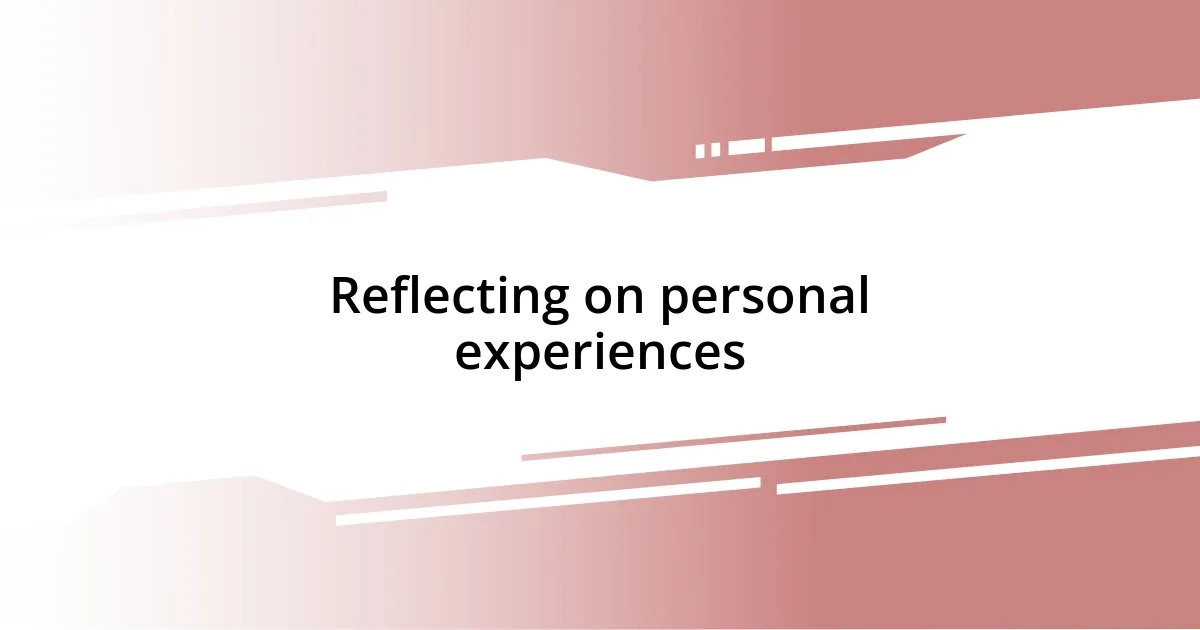
Reflecting on personal experiences
Reflecting on my experiences with intellectual humility often brings to mind a pivotal moment in my life. I recall a heated debate during a community meeting where my viewpoint clashed with someone else’s. Instead of defending my position fervently, I chose to listen. That decision felt liberating; I gained insights that altered my perspective, allowing me to appreciate the complexities that lie behind differing opinions. Have you ever found clarity in moments you thought would be purely confrontational?
There are times when I look back at moments of uncertainty that have profoundly shaped my understanding of humility. For instance, during a team project, I hesitated to voice my doubts about a proposed strategy. When I finally did, it turned out my concerns echoed the thoughts of others. That experience was both humbling and empowering, teaching me that voicing apprehensions can lead to richer discussions. It made me realize that vulnerability often fosters deeper connections. How often do we hold back our thoughts, thinking they may not matter?
One specific reflection stands out to me: accepting feedback can be one of the hardest yet most crucial aspects of intellectual humility. I remember receiving performance reviews early in my career that left me feeling defensive and disheartened. Over time, I learned to embrace these critiques as opportunities for growth. Each piece of feedback has become a stepping stone in my development, reminding me that nobody has all the answers. How about you—do you view feedback as a gift or a challenge?
